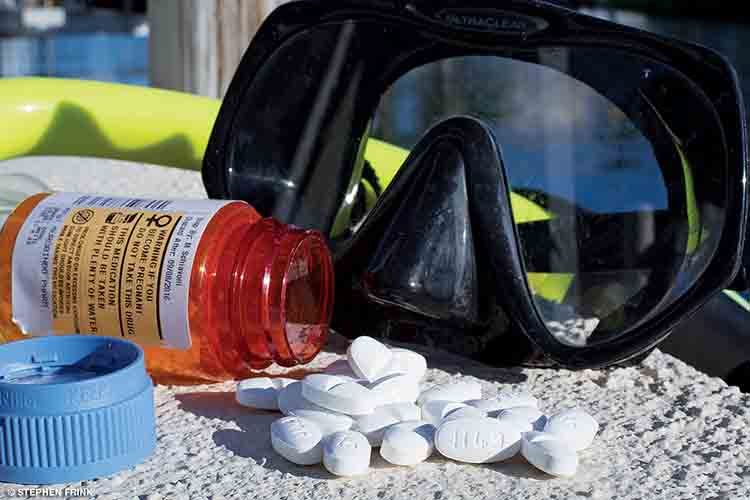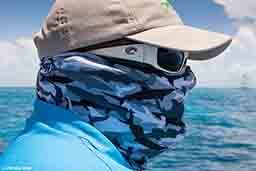I have been diagnosed with a medical condition, and I cannot find any specific information about it atDAN.org.How can I find out more about my condition and diving?
The International Classification of Diseases (ICD), published by the World Health Organization (WHO) and used by physicians around the world, lists 12,420 disease categories and more than 70,000 diagnostic codes. The DAN® website includes specific information about a wide range of health and medical issues relevant to divers and potential divers, but it is impossible to list every disease and medical condition.
Consider calling the DAN medical information line at +1-919-684-2948; DAN medics and physicians are available to discuss your diving-related health and safety questions Monday through Friday, 9 a.m. to 5 p.m. Eastern Time. DAN medics have a wealth of knowledge about fitness to dive and diving with various medical conditions. We also have close working relationships with several major university medical centers and a large global network of doctors of various specialties trained in dive medicine.
Next consider that questions about fitness for diving with many medical conditions can be answered based on general guiding principles. Several of the articles at DAN.org/medical/articles, such as “Cardiovascular Fitness and Diving,” “Diving and the Body Systems” and “Psychological Issues in Diving,” can give divers an understanding of the most important criteria for determining fitness to dive — even if their particular medical condition isn’t mentioned specifically.
While each individual’s health status must be considered on a case-by-case basis, divers with significant cardiovascular or respiratory disease, disabling musculoskeletal issues or limited exercise capacity are usually discouraged from participating in scuba diving. Diving requires a level of fitness that can accommodate sudden exertion: a long surface swim to the boat or shore, fighting a strong current, carrying gear, climbing a ladder, managing heavy surge or surf and rescuing oneself or one’s buddy. Poor physical fitness is a hazard to the diver as well as to dive buddies and/or potential rescuers.
A diver with physical limitations may wish to find a program specifically designed for divers with disabilities. There are a variety of adaptive dive programs for disabled divers. Some of these are therapeutic or rehabilitative by design, and these programs were created with medical support for both the disabled diver and the dive buddy.
— Marty McCafferty, EMT-P, DMT
My wife and I love to travel to exotic destinations, and my previous doctor used to give me antibiotics in case I got sick in a remote location. I have a new primary care physician who is hesitant to do this. What does DAN recommend?
For some time now prescribing guidelines regarding antibiotic use for various conditions have favored a much more conservative approach due to increasing antibiotic resistance. Many illnesses are viral in nature, and antibiotics are of no benefit in these cases. If you get sick while traveling, a local physician is your best resource; he or she will be aware of the common pathogens that cause problems in the area you are visiting.

When traveling, your best defenses against illness are handwashing, careful sourcing of water and food, getting relevant travel immunizations and taking appropriate precautions in areas where mosquitoes and other living organisms can transmit infectious diseases to humans. Talk to your doctor or visit a travel medicine clinic if you will be going to a region in which medical care is lacking. The doctor can advise you about any medications you should take with you and when to use them.
— Scott Smith, EMT-P, DMT
Lately I feel like I’m getting sunburned much more easily than I used to. I am taking a new medication; is there any chance that could be the cause?
Sunshine is a welcome addition to just about any day spent outdoors. For many people, a hat, a T-shirt and some sunscreen are sufficient to limit the negative effects of sun exposure.

Certain medications, however, can make people more sensitive to the sun’s ultraviolet (UV) rays; this is called photosensitivity. Both regularly and temporarily used medications can cause photosensitivity. Minor symptoms include skin reddening, itching or rash; more serious symptoms include a burn, blisters and discoloration or darkening of the skin. Report any significant or unusual reaction to a medication combined with sun exposure to your prescribing or primary care physician. Some reactions are serious.
There are more than 100 medications, both prescription and over-the-counter, that can cause increased susceptibility to UV rays, and these include both oral and topical medications. The best policy is to first read the label of any medication you take and then ask your physician and/or pharmacist about photosensitivity before exposure to the sun (or a tanning bed).
Drugs that may cause photosensitivity include antibiotics, antihistamines, cardiovascular medications (such as diuretics and blood pressure medications), nonsteroidal anti-inflammatory drugs (ibuprofen, indomethacin), some antidepressants and some antipsychotic medications.
Taking a medication that can cause photosensitivity doesn’t mean you have to avoid outdoor activities, it just means you should take extra precautions to lessen your exposure to UV light. Consider wearing a wide-brimmed hat, long sleeves and long pants, and reapply your sunscreen more frequently. Stay indoors around mid-day if possible, and seek shade when you’re outside.
— Joel Dovenbarger, BSN
I have been diving for 15 years without problems, but on my last couple of trips I experienced pain in my upper left abdomen under my ribs about 15-30 minutes into a dive. It becomes increasingly painful over the rest of the dive. I am healthy, take no prescription medications and exercise regularly. I usually take antacids prior to diving. I do not have this pain any other time. It gets more uncomfortable during ascent but goes away shortly after I get out of the water. It is starting to take the fun out of diving. Any suggestions?
Please note that we cannot diagnose you; you really need to be evaluated by a physician. Because your abdominal pain seems to change with pressure, it may be due to the expansion of gas in your gastrointestinal system. The increased discomfort during ascent in particular suggests trapped gas as a possibility. It could be normal gas resulting from digestion, or it could be from drinking carbonated beverages. Avoiding gassy foods such as beans, broccoli, cabbage and other cruciferous vegetables may help. Many divers stay away from sodas prior to diving to limit the amount of gas in the gastrointestinal system.
This may be evidence of a hernia. During ascent an isolated segment of bowel containing excess or expanding gas can expand, which may cause pain or injury. People should not dive with an unrepaired hernia. Other sources of abdominal pain include reflux, an irritated ulcer and other causes, but pain caused by these factors would be expected to occur at other times as well.
Another possibility that you should consider is that this may be related to swallowing air while breathing from your regulator. Divers swallow a certain amount of air as a result of breathing compressed gas, and a second stage with very low breathing resistance or that is prone to free flowing can increase air swallowing. You might consider having your regulator serviced and discussing your issues with the service technician. A “tightening up” of the second stage may help you.
Remember this is all speculation and that an evaluation by a doctor is crucial.
— Frances Smith, EMT-P, DMT
What do I need to know about diving with a cold sore?

Here are a few issues you should consider:
- Risk of further injury — Sun exposure or mechanical trauma from the mask and/or regulator may worsen the wound, creating a larger scab and lengthening the healing process.
- Infection — If the sore is bleeding, oozing or otherwise open, the risk of infection by pathogens in the water is significant. Cold sores can become complicated by bacterial infections, so it is important to wash them thoroughly with soap and water and keep them as clean and as dry (in general) as possible.
- Impaired mask fit — If a mask skirt will be placed over the sore in a way that rubs or irritates it, then diving should be postponed. The same is true of the regulator; if holding it would cause irritation, then diving would not be recommended.
- Transmission — Dive buddies should review procedures for buddy breathing in an out-of-air situation in light of the fact that cold sores are contagious. If gear is rented, ensure proper decontamination procedures are followed. Although it’s unlikely, there is always a chance that resuscitation may be needed. Thus, precautions should be taken to prevent disease transmission. This is normally not an issue because barrier devices are readily available in most first aid kits.
Treatments such as penciclovir (Denavir) and docosanol (Abreva) can soften the skin and promote healing. Topical numbing agents such as phenol and menthol may be used for comfort. See your doctor and begin using an over-the-counter product at the first sign of a cold sore; beginning antiviral therapy within the first 48 hours can speed recovery.
— Lana Sorrell, EMT, DMT
© Alert Diver — Q1 Winter 2016